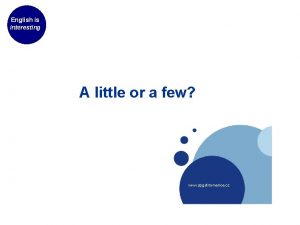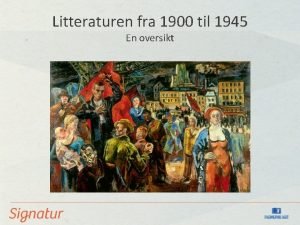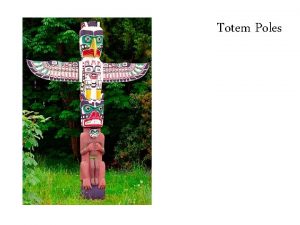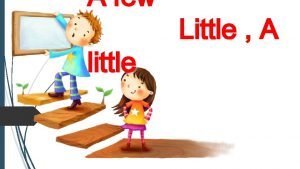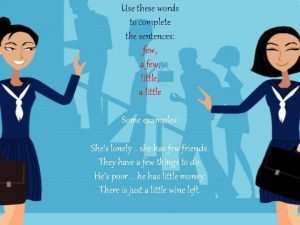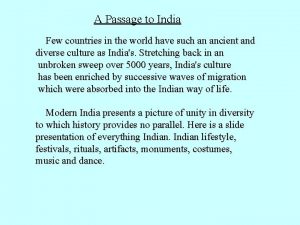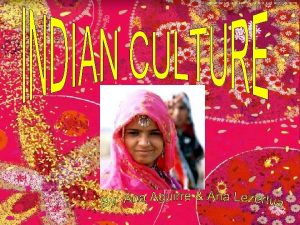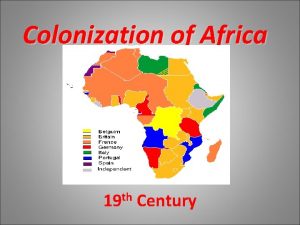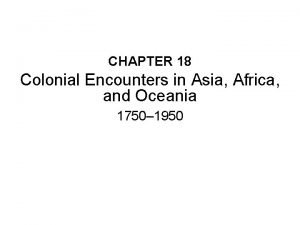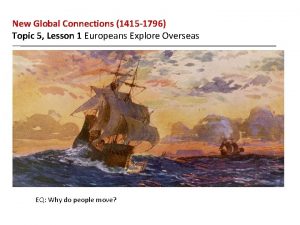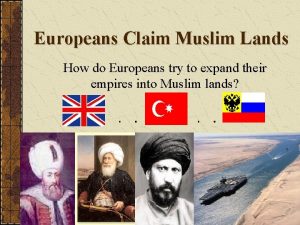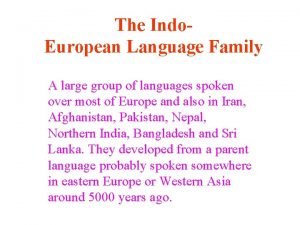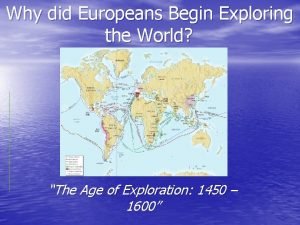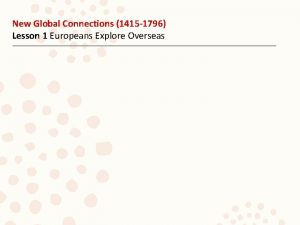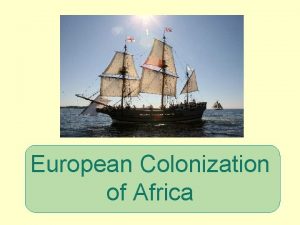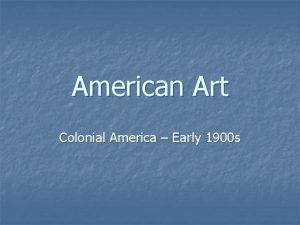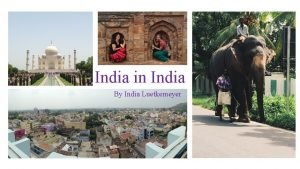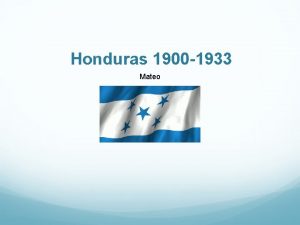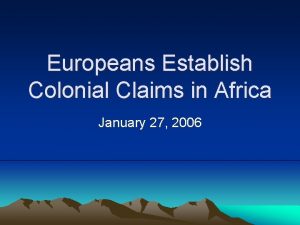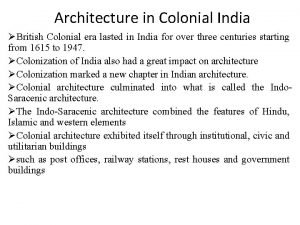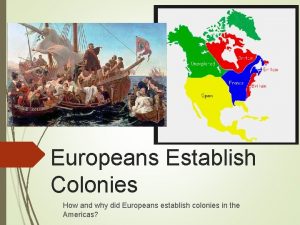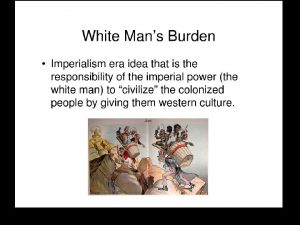AFRICA INDIA 1900 1945 COLONIAL AFRICA Few Europeans
















- Slides: 16

AFRICA & INDIA 1900 -1945

COLONIAL AFRICA • Few Europeans lived in Africa BUT – Built railroads, mines, companies, plantations – Europeans benefitted, Africans did not Europeans brought health care – not enough Europeans brought mission schools – western ideas Africans migrated to cities because they offered jobs, but it hurt families

AFRICA & INDIA • Western education and the realities of racial discrimination contributed to the RISE OF NATIONALISM (both Africa and India) • Many Africans served in WWII • They listened to Allied propoganda in favor of liberation against Nazi’s and came back with liberation ideas against the Europeans

NATIONALISTS Blaise Diagne, Senegal • Wanted more African participation in politics and fair treatment in French army African National Congress, South Africa • Inspired by pan-Africanists from America such as W. E. B. Du Bois and Marcus Garvey • Wanted unity of African people around the world

ALGERIA VIOLENCE for Independnece • France had control of Algeria and did not want to let it go (gas/oil fields, trade) • Algerian Revolutionary Organization (FLN) VIOLENTLY fought and won independence, but France angry…French left but it hurt Algerian economy…. Algerians went to France for jobs and were treated pooly

WHY DECOLONIZATION NOW? • Ideals (Christianity, enlightenment, increasingly democratic ideas is opposite of racism, exploitation and poverty) • Weak Europe (WWII loss, superpowers, UN) • Western-educated men in Africa and India (social and economic changes, learned what is unfair and how to organize, learned legal system and European culture – knew how to fight it!)

SIMILARITIES? • Leaders as “father-figures” • Recruit mass followings • Experiments with how to run a country • In Africa – many military coups

GHANA Non-violent independence • Britain tired after WWII • Kwame Nkrumah became leader and Ghana first African colony to achieve independence in Africa • Kwame a very powerful nationalist speaker, but not a great administrator…. ousted by army

KENYA Violent independence • Jomo Kenyatta was nationalist leader • Led a nationalist group called MAU who fought with the British • British charged Kenyatta and put him in prison for 8 years • In 1961 – released him and then helped write a constitution for independent Kenya • EFFECTIVE leader (unlike Nkrumah)

SOUTH AFRICA • Apartheid in South Africa • ANC (African National Congress) opposed it…at first non-violent (protests, strikes) • After Sharpville shootings, violence as Nelson Mandela organized guerrilla resistance • Sentenced to life in prison • 1986 – 2 million person general strike • International pressure to end apartheid • 1994 – Mandela freed – becomes President!

HAILE SELASSIE, Ethiopia • Ethiopia beat Italians under Menelik – battle of Adwa – in 1889 • After Mussolini (Italy) invaded in 1935, Selassie made speech to League for help - Ignored • Exiled in England, until war over

Rastafarian Movement • Ras – “Duke” or “leader”, Tafari (Selassie’s name) • Jamaicans believe that Haile Selassie is the messiah – will lead the African diaspora back • Zion is Africa, especially Ethiopia • Bob Marley is best known rastafarian

SIMILARITIES BETWEEN INDIA & AFRICAN INDEPENDENCE • Both fighting British influence and government to obtain independence • Both had strong, nationalistic leaders and organizations (Gandhi INC; Mandela ANC) • Both started as non-violent • Both nationalist movements that won freedom were divided and conflicted (India – Muslim vs. Hindu’s; Africa different groups)

DIFFERENCES BETWEEN INDIA & S. AFRICA INDIA AFRICA • Religious differences between Muslim & Hindus • Leader (Gandhi) – no violence • Country split into 2 (Pakistan and India) at Independence – many Muslims and Hindus died • No differences in ANC on religious grounds • Apartheid • Leader (Mandela) resorted to violence • Country remained intact at independence

WHY THE BIG DIFFERENCES INDIA AFRICA • India had practice with Western-style democracy (elections, parties, civil liberties, education etc…) • Struggle for independence had been long giving India time to sort leadership out • British handed over power more gradually • Some say not ready? • Tribal problems , traditional culture & immense diversity led to violence and ethnic conflict • Economic performance was poor – disappointing nationalists & causing problems • Africa does not depend on land-owning class

Readings Questions • SUMMARIZE the READING • What is the MAIN POINT that each man is trying to make about imperialism/colonialism? • How effective is Kenyatta’s fable? Why? How does it reflect him as a person? • How effective s Nkrumah’s speech? How does Nkrumah see himself in the world?
 She's lucky she has few problems
She's lucky she has few problems Nyrealisme
Nyrealisme What is a totem
What is a totem Fill in a few a little
Fill in a few a little Complete the sentences with these words
Complete the sentences with these words Litle a
Litle a Few countries are as great as india
Few countries are as great as india Few countries are as great as india
Few countries are as great as india Colonization
Colonization Colonial encounters in asia africa and oceania
Colonial encounters in asia africa and oceania Chapter 18 colonial encounters in asia and africa
Chapter 18 colonial encounters in asia and africa New global connections test answers
New global connections test answers Europeans claim muslim lands
Europeans claim muslim lands Indo-europeans definition
Indo-europeans definition Why did europeans start exploring
Why did europeans start exploring Clean energy for all europeans
Clean energy for all europeans Lesson 1 europeans explore overseas
Lesson 1 europeans explore overseas
